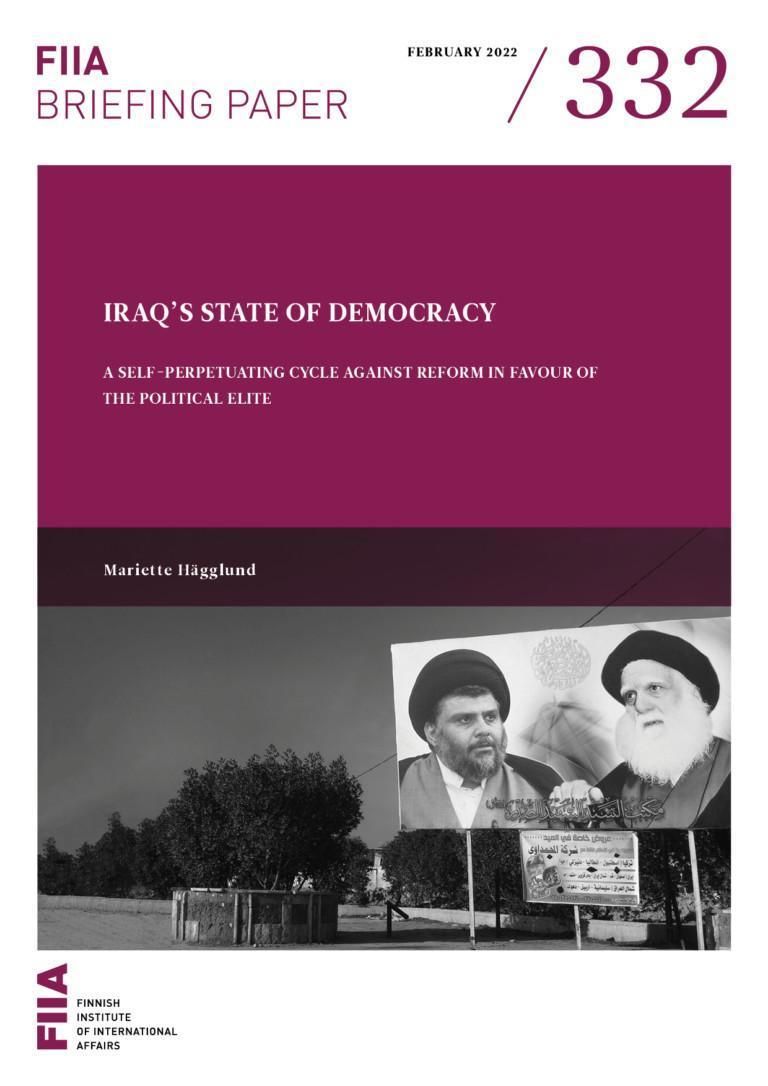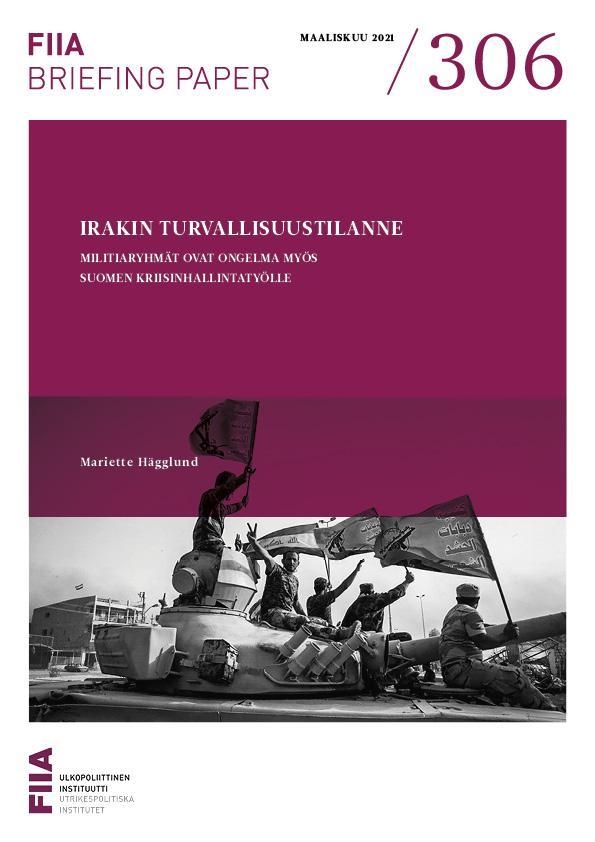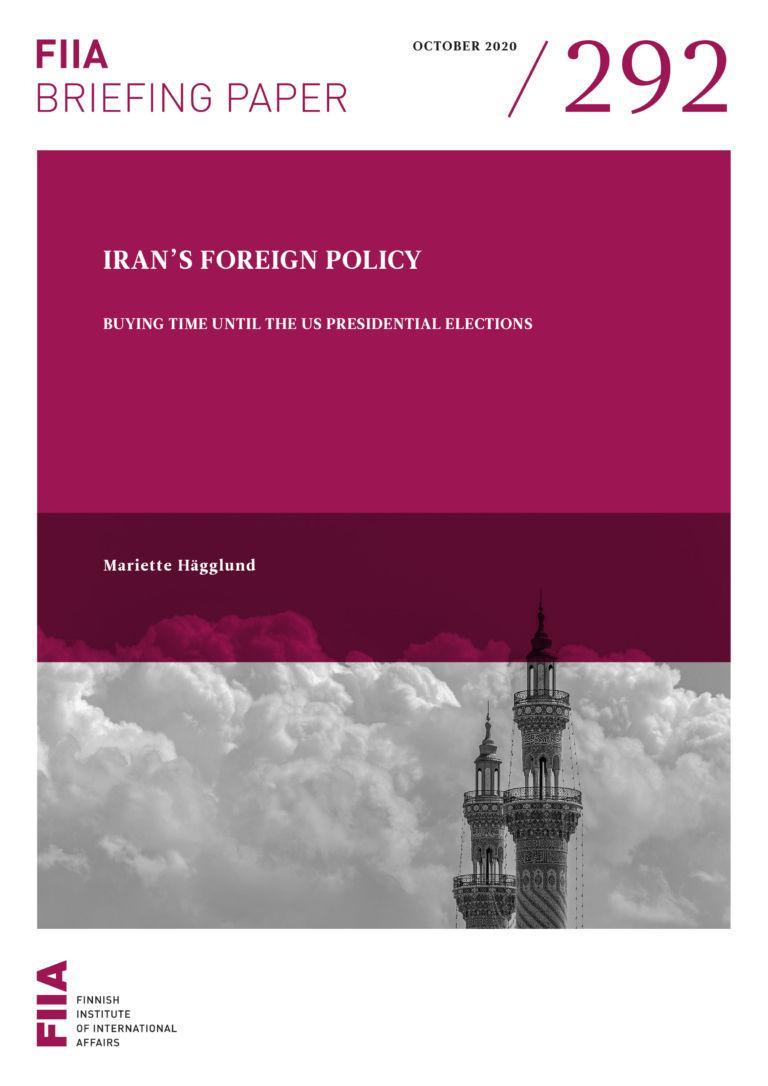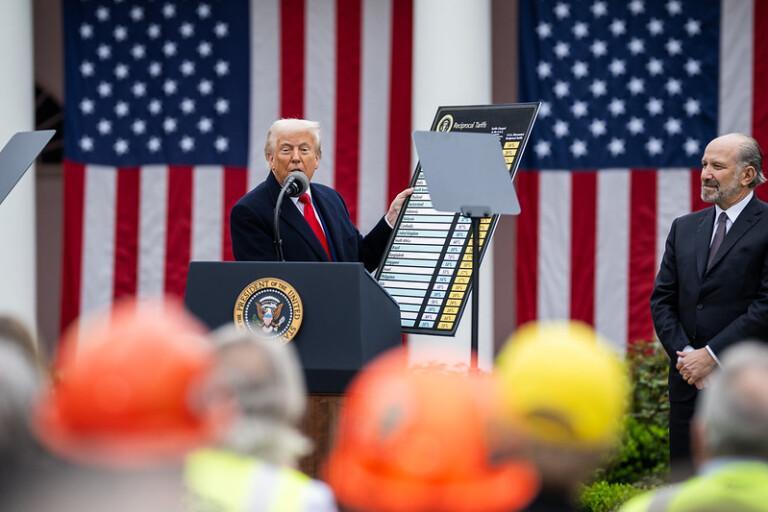
In addition to Afghanistan, Iraq has been one of the US’s major state-building projects in the 21st The recent events in Afghanistan have again highlighted criticism against large-scale interventions.
The changes in Iraq’s electoral law have brought about some positive changes, but did not address the root causes of the problems in the political system.
Institutions in Iraq are weak and marred by politicization and pressure from powerful parties. Hence, their independence is highly questionable.
While improving democracy in Iraq would require radical change, taking minor steps forward remains a more attractive and doable option for the Iraqi and international leadership. However, by working with established political players, the very barriers to more significant reform are simultaneously being strengthened.
Introduction
The withdrawal of international troops from Afghanistan and the worsening humanitarian crisis have raised questions about the success and failure of large-scale interventions. After the September 11 attacks and the consequent war on terror, regime change emerged as an instrument to address that threat. Initially said to be a brief operation, the US invasion of Iraq ended up morphing into a major state-building project. President George W. Bush himself noted in 2005 that the US goal in Iraq “has always been more than the removal of a brutal dictator. It is to leave a free and democratic Iraq in its place”.[1]
Fast forward to 2021: At a performative level, Iraqi democracy functions. A parliamentary election was held in October, and international election observers portrayed it as technically clean. Incidents like suspicious warehouse fires, intimidation, vote-buying and technical glitches that had characterized the previous election in 2018 were not in evidence. Despite protests against the results, claims of a fraudulent electoral process, and demands by the losing parties to organize a new election, the Supreme Court of Iraq finally approved the results in late December. Coalition negotiations and government formation are currently underway.
Yet, as the saying goes, all modern democracies hold elections, but not all elections are democratic. The V-Dem Institute categorizes Iraq as an electoral autocracy and places it 124th out of 174 countries in its 2020 report. Freedom House’s “Freedom in the World” index gives Iraq 29 points out of 100. In a recent poll, 77% of respondents saw Iraq’s current state of democracy as “very” or “somewhat” bad.[2] Voter turnout has steadily decreased from 70% in the first election in 2005 to 43% in the most recent election, according to the most positive assessment. Even in a regional comparison, with a poor record in political freedoms, Iraqi performance is not encouraging (Figure 1). Yet Iraq received an invitation to the Summit for Democracy hosted by President Biden on November 8–9, 2021, and was, along with Israel, one of only two countries from the Middle East to receive one.

Figure 1: Comparison of Democracy Index in 2020 (Scale 1–10, with 10 = best)
Source: Economist Intelligence Unit
This Briefing Paper analyzes the state of democracy in Iraq through the prism of the political system created in the aftermath of the invasion in 2003. The paper looks at the recent results in the October 2021 parliamentary election and explains some of the reasons for the outcome, especially in light of the new electoral system. Major structural barriers to change and limitations to a functioning democratic system are also discussed.
You scratch my back and I'll scratch yours
The political system set up after the US invasion in 2003 was divided into ethno-sectarian categories of Sunni, Shia and Kurds in an attempt to create a political balance. Instead, this ended up simplifying the diversity of the country, favouring some groups over others, excluding large segments of society, increasing identity politics, and politicizing ethnoreligious groups. These divisions include everything from ministries and government positions to parliament and state institutions.
Essentially, elections in Iraq do matter even if informal processes are more significant. The better one performs in elections, the better one’s position in the informal process that forms coalitions, negotiates the next government and distributes various ministries and other positions following elections. The tendency to form consensus governments in Iraq has not only made them very ineffective, but also enabled the elite to secure their share of the government budget and positions. This clientelism has led to a system whereby the elite’s interest lies in favouring and advancing itself, and taking advantage of the system and resources as much as possible, while losing sight of the long-term damage it is doing to the country.
Besides ministries and ministerial positions, parties can get hold of governorships, provincial budgets and senior technocratic positions in various institutions. These positions are highly useful in that the authorities are in charge of issuing state agreements and contracts, which fuels corruption even further. Sometimes shell companies are created by parties, state contracts are awarded to them, and thus the circle of keeping resources in the hands of specific actors is closed. This has been a concern in reconstruction efforts, for example. Furthermore, the wage bill’s share in the state budget has skyrocketed from 7% to 40% in the past 20 years,[3] yet the government is both unable and unwilling to meet popular demands to provide jobs for young people, and public services and infrastructure remain weak. Although corruption levels have decreased slightly, Iraq still ranks as the 23rd most corrupt country in the world according to Transparency International.
Winners and losers in the election
The disillusionment and dissatisfaction with the political system, corruption and service provision resulted in massive anti-government protests in Iraq. In autumn 2019, protest movements demanded political reform, changes to the electoral law, and the abolishment of the ethno-sectarian system in place after the invasion. The protests were violently repressed, resulting in more than 600 dead and thousands injured. In response, the government resigned, early elections were announced and changes were made to the electoral law.
The amended law included a first-past-the-post and single non-transferable vote system (SNTV): one vote directly for one candidate in each district, and the votes could not be distributed to anyone else. Previously, the old electoral law allowed the transfer of votes within a party: after securing a seat for the top candidate, the overflow votes could be distributed to others within the party. The new modifications also increased the number of electoral districts from 18 governorates to 83 districts based on the quota seat for women. The age limit for standing in elections was reduced from 30 to 28. The changes were the result of months of negotiations and the parliament weakened the initial draft. The turnout was the lowest since 2005, at 43% according to the most optimistic estimates.
Shia cleric and populist politician Muqtada al-Sadr emerged as the clear winner in the election. This was not solely based on the ability to mobilize his voter base, which is important in Iraq, where personalism weighs heavily, but rather on the very effective and strategic utilization of the new electoral law. A case in point is the fact that Sadr increased his share from 54 to 73 seats in the parliament with 889,000 votes. Former Prime Minister Nouri al-Maliki’s State of Law party received roughly 504,000 votes and 33 seats. Meanwhile, the pro-Iran Fatah Alliance, which is the political umbrella for many pro-Iran Shia militias, received 462,000 votes but only 17 seats.[4] Along with some other established players like former Prime Minister Haider al-Abadi and cleric Ammar al-Hakim, it was one the biggest losers in the election, dropping from 48 seats in the 2018 election (See Table 1[5], [6]).

Table 1: Selected election results for the Council of Representatives. Total number of seats = 329.
The election also brought about some positive developments – each with its own caveats, however. Firstly, the minimum quota for women was exceeded, resulting in 97 candidates winning seats. While this is encouraging for female participation in public life, women are neither automatically disconnected from politics, nor do they always represent policies that favour the rights of women. Moreover, presence in the legislature does not necessarily translate into political power in a patriarchal society. Women candidates often face a multitude of challenges such as extortion or attempts to damage their reputation.
Secondly, independents received a whopping 1.7 million votes in total and 37 seats. Considering that polls suggested that most Iraqis favoured voting for a previously unknown candidate with no party affiliation, it remains to be seen how many of the self-proclaimed independents are party loyalists in disguise.
Thirdly, the Reach party (Imtidaad), which arose from the 2019 October protest movement, managed to gain nine seats and almost 300,000 votes despite voter apathy, particularly among young people. New Generation (Naway Nwe), which emerged in 2018 in the Kurdistan Region of Iraq, is also linked to protest movements in the region. With a higher voter turnout and a more organized and unified protest movement, they could have fared even better. Some cooperation between them and independents might arise, but unfortunately the operational environment will remain a challenge, as will be elaborated below.
Institutional weakness
State-building includes building effective governmental systems and institutions. Although there are attempts to improve democracy and the rule of law in Iraq, one of the very first problems one runs into is the weakness of institutions. A recent poll revealed that distrust in political parties stands at 94%, distrust in the parliament at 83%, and in the Independent High Election Commission (IHEC) at 74%.[7] Considering that institution-building has been part of various forms of state- and peace-building initiatives for nearly 20 years, these numbers are discouraging.
Many of the institutions in Iraq are overseen by or responsible to the parliament – itself a flawed institution. Members of the IHEC that runs the electoral system resigned in protest at alleged interference before the 2014 election. In 2018, some of its election officials were sacked for corruption.[8] In the last election, IHEC members were again threatened and pressured by the losing parties. The integrity of the Supreme Court, which ratified the election results, is challenged by corruption, threats against the judiciary and pressure to take positions or interpret laws in favour of powerful actors.[9] Recently, the Supreme Court stripped the immunity previously granted to parliamentarians. However, because of the weak institutions and lack of accountability, it remains unlikely that anyone will be punished for corruption. On the other hand, corruption can be an effective tool in getting rid of rivals. If legal cases are pursued, it is not uncommon that people working on the cases are threatened. The weakness and questionable independence make it difficult to pursue justice through official and legal means in Iraq.
Moreover, the Central Bank of Iraq and a number of private banks (which are often owned by political parties) have been accused of corruption and money laundering.[10] This is also a problem when it comes to elections: since there is little transparency in terms of campaign funding, it cannot be ruled out that state money is used by those already in power to get re-elected, tilting the competition in favour of those already established in the political system. There is also no financial limit on the money spent on the campaign, and foreign funding is a reason for concern in a fragile country like Iraq.
Many Iraqi media outlets are owned by politicians or political parties, making the information environment biased. Although internet freedom in Iraq is better than in many of its neighbouring countries and few websites are restricted, it remains limited. Freedom House notes that “[internet service providers] in Iraq are private companies, many have close ties to the government and security services”,[11] raising questions of information security. For example, one of the largest telecom companies in Iraq, Korek Telecom, is owned by a member of the Barzani family, which leads one of the two dominant parties in Iraqi Kurdistan, the KDP.
Social media has emerged as an alternative media, especially for civil society, and was crucial in mobilizing the 2019 protests. However, this was also precisely why both the federal government and the Kurdistan Regional Government (KRG) blocked certain social media channels, and eventually even shut down the whole internet. Harassment and threats remain an issue faced in particular by activists and journalists.
Lack of trust in institutions makes it easier to stir up ill-feeling towards them. Fateh vocally opposed the preliminary election outcome, claiming it was a scam and a result of electoral manipulation. Media outlets linked to the militias started an aggressive campaign against the UN in an effort to undermine the results. Some more radical elements even threatened violent escalation. Even the institution of the Prime Minister was not safe: Prime Minister Kadhimi was the victim of a drone attack in November, speculated to be either an actual assassination attempt or a warning to him from his rivals.
The politicization of what are supposed to be independent civilian institutions actually serves the interests of the elite. Party loyalists are inserted within them and, where independent technocrats exist, they are pressured to act in a way that favours political actors. This also makes it very difficult to break the cycle. They will not agree to changes that pull the rug from under their feet – at least not by choice. When minor reforms are adopted, they are implemented in a way that enables the major political actors to ensure their own survival.
No room for an opposition
Although Iraq’s constitution bars militias from standing in elections, most of the influential parties have a militia backing them and run militia members as candidates. Others, like Fateh, represent a militia-cum-political party. Yet again, several militia members were elected to parliament, where they try to manipulate state institutions from within. Having a strong presence in the legislative arm in the state structure provides a good negotiating position in the bargaining process following elections. They can also participate in official legislative processes and use their positions in government to further their own interests. For example, after the 2018 election, the budget of the Popular Mobilization Forces (PMF) – an umbrella for mainly Shia militias mobilized in the fight against ISIS – was increased even though the fight against ISIS was not as acute as in previous years.
This dynamic is particularly problematic when it comes to the possibility for an opposition to emerge. It is visible in the radical deterioration of civil liberties in recent years in the otherwise rather stagnant political development over the last 15 years (Figure 2). The state is supposed to strengthen civil society institutions, but paradoxically the (un)official (para)military institutions that are supposed to be part of the state are preventing any from functioning properly. When civil society actors demand political reform, they are threatening the very political establishments that are backed by paramilitary groups, both of whom have a vested interest in preserving the status quo. Not only were the 2019 protest movement activists subjected to brutal violence during the protests, but also to systematic targeting, assassinations and threats by militia groups. This was one of the major reasonswhy activists boycotted the election. Thus, to put the blame for the dysfunctional system on the lack of an opposition is to approach the problem from the wrong perspective.

Figure 2: Iraq’s democratic development
(Source Economist Intelligence Unit 2006–2020)
The militia dynamic in the political system is also reflected in the minority vote. Nine seats are allocated to Iraq’s minorities, out of which five are for Christians. Four out of the five seats went to people affiliated with the Christian Babylon Brigades – a militia part of the PMF structure seen to be close to Fateh and Iran. This provoked vehement criticism to the effect that Babylon does not represent Christian interests, and vociferous comments about whether only minorities should be allowed to vote for minorities.
Sadr himself also has his own militias called Peace Brigades (Saraya al-Salam), who are an offshoot of the notorious Mahdi Army that fought the US invasion after 2003. The (para)militarized political landscape provides its own twist to the government formation process: the fear is that by excluding some actors, Sadr will provoke a violent backlash. However, those excluded from a possible majority government will try to find other means of exerting pressure and, eventually, a compromise is likely to emerge that favours the negotiating parties – not the Iraqi people.
Conclusion: Stability overrides democracy?
In the current situation, the political competition is neither free nor fair. It is restricted to the political elite and revolves around access to power and resources. Despite political activism, the government remains dysfunctional. Elections only mean a change of faces in another closed space of power. It is thus hardly surprising that voter apathy is at its highest. The last 15 years have not provided much hope for the sought-after neoliberal transformation of Iraq into a democratic state.
To actually achieve real development towards a less authoritarian democracy, the political system would need a radical overhaul. However, that change poses a threat to the ruling elite, who have an interest in preserving the status quo. Alternatives are usually portrayed as chaos and anarchy, with the re-emergence of ISIS, or Iraq becoming the new Syria or Yemen. Although the US promotes and funds democracy in Iraq, radical change incurs risks as it may endanger the efforts made so far. In 2020 alone, the US obligated more than $1 billion to Iraq, $76 million of which was directed at democracy, human rights and governance.[12] The conundrum between stability vs. democracy is a familiar sight in other regions.
Taking minor steps forward remains a more attractive option for both the US and the Iraqi leadership. However, by working with established political players, the very barriers to reform are simultaneously strengthened. Due to the patronage network and rampant corruption, many of the elite have benefited from various investment projects and contracts, and long-term cooperation in supporting institutions has further legitimized their position.
As the whole political system is flawed and the parliament is not representative of the general population’s will, decisions taken by the establishment should not be taken at face value. The national interest often comes second. Instead, decisions are likely taken in the interest of the elite, their patronage networks, or even an outside state, since Iraqi politics is facing challenges that are typical of fragile states. Regional and international competition underpins constant violations of its sovereignty. Turkey conducts airstrikes in the north, Iran has had a tight grip on some parts of society, the US has a problematic legacy, and its presence divides opinions. Many Gulf states have increased their investments or aid projects in Iraq. Parts of the political elite are dependent on outside actors’ support for their own political survival, or may alternatively use them to favour their own agendas.
Since Sadr emerged as the winner in the election, some have even suggested that he could be a potential partner for the US, especially after he signalled that the presence of US troops in the country would be possible based on negotiations. Sadr might be considered the lesser evil in the grand scheme of things since, contrary to other actors, his militias are not conducting attacks against the US. While this is indicative of how violent non-state actors adapt and evolve (considering his Mahdi army fought the US occupation post-2003), he remains a problematic actor for many Iraqis. The statement which, on the face of it, might appear to be a positive gesture towards the US and the international community, actually benefits him in the internal rivalry between himself and other powerful actors in the country. The US has previously put its money on people who have been highly controversial nationally, such as Nouri al-Maliki, who was – and is – close to Iran and was accused of soliciting sectarian violence.
The fact that Iraq received an invitation to the Summit of Democracy appears to be more related to hopes and support for the process in Iraq, and the US legacy in the country, than to political realities. The positive surprises that occurred on election day, achieved through minor concessions, are yet to translate into real political change, and the next four years will determine whether they contribute to any improvements. If so, the next election may witness not only a higher voter turnout, but also more strategic campaigning by the political elite.
Endnotes
[1] CNN (2005) “Transcript of Bush speech”, 15 December 2005, http://edition.cnn.com/2005/POLITICS/12/14/bush.transcript/.
[2] International Republican Institute (2020), New Iraq Poll: Despite Distrust in Institutions, Iraqis Value Democratic Process, 15 December 2020, https://www.iri.org/resource/new-iraq-poll-despite-distrust-institutions-iraqis-value-democratic-process.
[3] International Monetary Fund (2017). Iraq: Reining in Current Expenditure to Create Fiscal Space for Inclusive Growth, 9 August 2017, https://www.elibrary.imf.org/view/journals/002/2017/252/article-A001-en.xml?rskey=wCSwYD&result=26.
[4] IHEC (2021). The final results of the 2021 Iraqi parliament elections, IHEC website, https://ihec.iq/%d8%a7%d9%84%d9%86%d8%aa%d8%a7%d8%a6%d8%ac/.
[5] Ibid.; for 2018 results, see Khafaji, I. (2018). Iraq 2018 Elections: Between Sectarianism and the Nation, Arab Reform Initiative, 12 July 2018, https://www.arab-reform.net/publication/iraq-2018-elections-between-sectarianism-and-the-nation/.
[6] In the 2018 election, Halbousi’s party was called “Anbar is Our Identity”. It gained six seats and formed a coalition with al-Binaa, headed by Nouri al-Maliki and Hadi al-Ameri.
[7] International Republican Institute (2020), New Iraq Poll: Despite Distrust in Institutions, Iraqis Value Democratic Process, 15 December 2020, https://www.iri.org/resource/new-iraq-poll-despite-distrust-institutions-iraqis-value-democratic-process.
[8] Reuters (2014). Iraq electoral commission retracts resignation before vote, 30 March 2014, https://www.reuters.com/article/us-iraq-vote-idUKBREA2T0DZ20140330.
[9] See, for example, Knights, M. (2021). Iraq’s Judiciary Weak Link, Washington Institute, 10 June 2021, https://www.washingtoninstitute.org/policy-analysis/iraqs-judiciary-weak-link.
[10] al-Salhy, S. (2020). Iraq's central bank under investigation for alleged money laundering, Middle East Eye, 26 December 2020, https://www.middleeasteye.net/news/iraq-central-bank-investigation-alleged-money-laundering#:~:text=Iraq's%20Supreme%20Judicial%20Council%20is,have%20told%20Middle%20East%20Eye.&text=The%20CBI%20then%20sells%20the,10%20dinars%20on%20the%20dollar.
[11] Freedom House (2021). Iraq, https://freedomhouse.org/country/iraq/freedom-net/2021.
[12] ForeignAssistance.gov website, https://foreignassistance.gov/.








